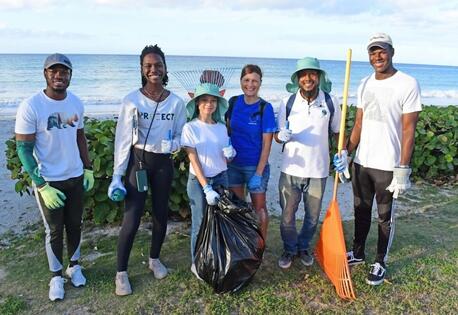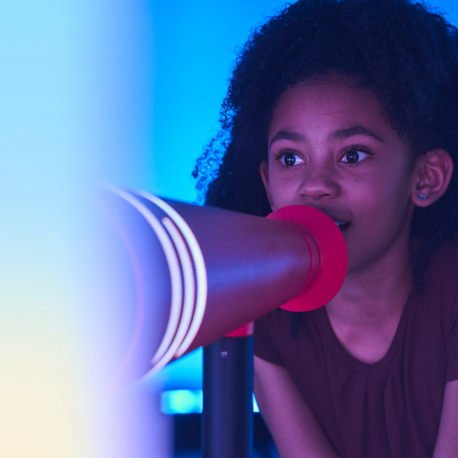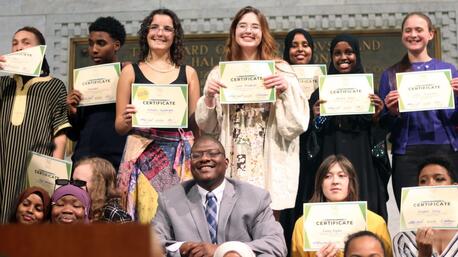
Minneapolis Officially Recognized as a UNICEF Child Friendly City
Reaffirming its commitment to creating a supportive environment for every child and young person, Minneapolis has been officially designated as a UNICEF Child Friendly City as part of the Child Friendly Cities Initiative (CFCI).
How to build a better city by realizing children's rights
Four years to the day after Minneapolis joined forces with UNICEF's Child Friendly Cities Initiative (CFCI), the city is being recognized as an official UNICEF Child Friendly City.
Minneapolis is the second U.S. city to achieve this distinction, just behind Houston, which was designated a Child Friendly City in August 2023. Since its global launch in 1996 to protect children’s rights in an increasingly urbanized and decentralized world, CFCI's child rights framework has been adopted in more than 3,500 municipalities across 40 countries.
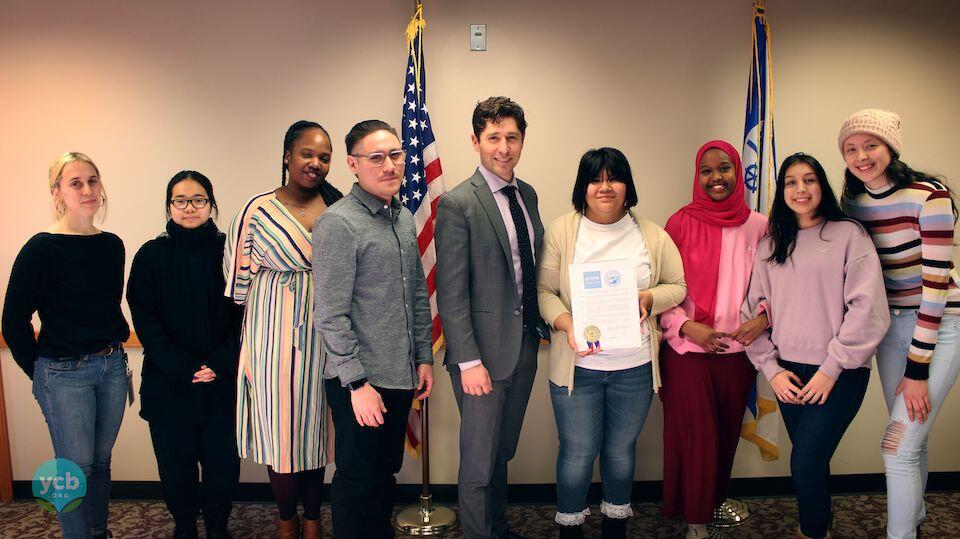
What is the Child Friendly Cities Initiative (CFCI)?
Drawing on the strength of existing local efforts to improve child well-being, the CFCI brings UNICEF together with community stakeholders to ensure children's needs and concerns are front and center in city planning and policy-making. The initiative supports municipal governments in realizing the rights of children at the local level by using the framework of the United Nations Convention on the Rights of the Child (CRC), the most widely ratified human rights treaty in history.
The CFCI seeks to create and implement a data- and outcomes-driven, partnership-based action plan that secures and protects the rights of all children and elevates youth voice in local governance and decision-making. As the CFCI framework is established and implemented, communities are improved, neighborhoods become safer, schools and health systems function better, and infrastructure is strengthened for all citizens.
A UNICEF Child Friendly City designation:
- Recognizes a city's advancement of child rights
- Affirms a city's commitment to eliminate discrimination against children through local government policies and actions
- Requires inclusive and meaningful child and youth participation in local decision-making through mechanisms such as youth councils
- Indicates a thorough assessment of the community was conducted, a detailed local action plan for children was created, and that much of the plan was implemented.

Minneapolis's CFCI local action plan
The Minneapolis Health Department and Youth Coordinating Board worked collaboratively with city leaders, government agencies, service providers, nonprofits and — most importantly — youth and families to work towards becoming a Child Friendly City.
One of the first steps was to create a CFCI local action plan. The City of Minneapolis's plan highlights four top priorities: emergency management and preparedness planning, youth voice in decision-making spaces, community safety and child rights education.
Emergency management and preparedness a top priority
Emergency preparedness was identified as a priority in the wake of three recent events, the Francis Drake Hotel fire in 2019, the COVID-19 pandemic, and the murder of George Floyd by Minneapolis police in 2020 and the resulting racial reckoning. Since the launch of the local action plan, Minneapolis has:
- Updated city emergency operation plans to intentionally include and consider children and families during response and recovery
- Engaged in the National Association of County and City Health Officials (NACCHO) to increase the capacity of local public health departments to prioritize mothers and children in preparedness and response.
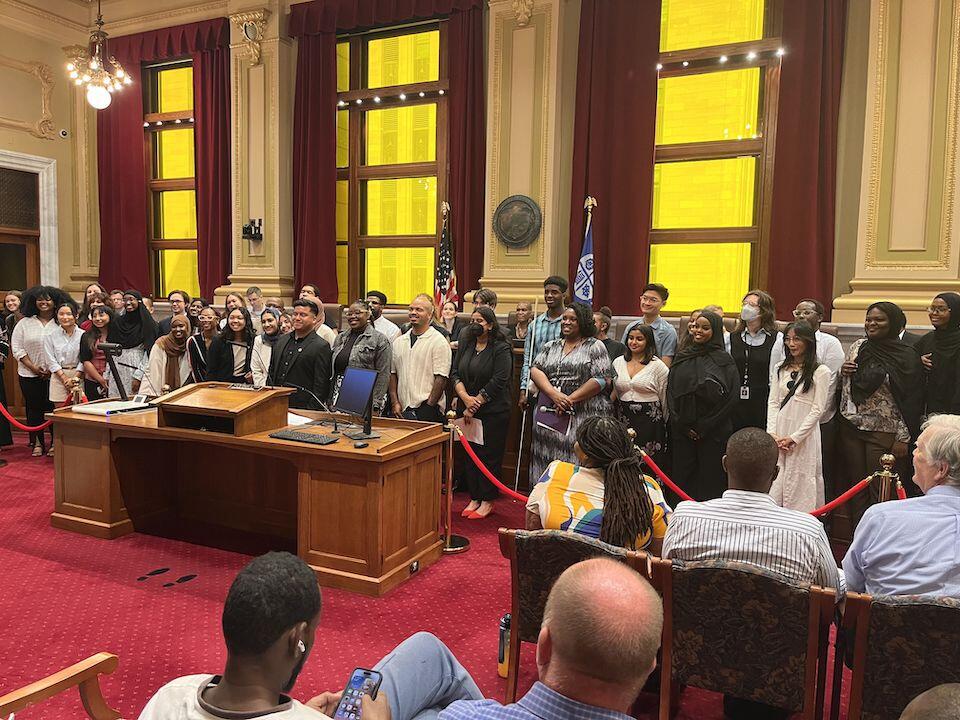
Young people need a seat at the table to help steer public policy
To build a truly child-friendly community, the voices of young people need to be included in decision-making, so Minneapolis set out to increase youth participation on city boards, commissions and committees. With support from the United Way, the City of Minneapolis and the Minneapolis Youth Coordinating Board (YCB) piloted the Youth on Boards Program and placed six young people on three boards in an advisory capacity. The city is currently working to give voting power to youth board members, a key step in meaningful youth inclusion.
Over the next year, the city plans to expand the number of young people serving on boards and committees, and include adult trainings and resources for engaging youth through an orientation that emphasizes power sharing.
Community safety a key issue
Minneapolis is often cited as one of the best places to live in the U.S., but measures of well-being often reveal significant racial disparities. The city has become increasingly segregated and that segregation perpetuates significant inequities, including the burden of violent crime.
In October 2023, young people conducted interviews with over 100 of their peers for a Community Safety Report produced by the Minneapolis Youth Coordinating Board (YCB). The survey also included data from parents of young children in the Minneapolis area Core themes that surfaced were the need for community involvement, addressing police relations, ensuring safe educational environments and establishing a replicable support system. "A collective voice emerged, " the report's authors noted, "advocating for a peaceful, united Minneapolis, free from the menace of gun violence." The report was the first step to providing recommendations to the city around important community safety work.
Every child is born with basic human rights
In 2023, Minneapolis expanded its popular Reach Out and Read Minnesota initiative, distributing free books to children and their parents via hospitals and health clinics in Hennepin County. Research shows that participating families read more often to their children; the program also builds trust between parents and caregivers and their children's health care provider and increases attendance rates for well-child visits. Some of the books introduce the concept of children's rights as outlined in the CRC: every child, no matter where they are born or where they live, has the right to food, water and shelter, to go to school, to be free from violence, to breathe clean air and more.
Being recognized as a UNICEF Child Friendly City "does not mean everything is perfect for children" in Minneapolis, said Michael J. Nyenhuis, UNICEF USA's president and CEO. "But it does say that the city has a commitment to continue the work." By signing on to a global network that values children, the City of Minneapolis has affirmed its intention to prioritize the needs of children and young people and create a better future for everyone.
Every child and young person has the right to health, education, protection and participation. CFCI cities can make these rights a reality. Urge your mayor or municipal office to keep children top of mind in every policy and funding decision while engaging children and youth along the way.
